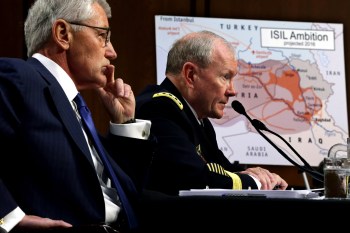WASHINGTON — Just a week after President Obama pledged not to send combat troops to Iraq, his top military adviser left the door open to using American forces to “accompany Iraqi forces in attacks.”
In closely watched Senate testimony, Army Gen. Martin Dempsey, chairman of the Joint Chiefs of Staff, said expanded US involvement couldn’t be ruled out if the strategy for taking on the brutal ISIS terrorists isn’t successful.
“My view at this point is that this coalition is the appropriate way forward,” said Dempsey, in reference to a multination alliance joining to take the fight to ISIS.
“I believe that will prove true, but if it fails to be true and if there are threats to the United States, then I of course would go back to the president and make a recommendation that may include the use of US military ground forces,” Dempsey said under questioning.
Obama has already sent more than 1,000 US special forces to Iraq, but they’re advising Iraqis and protecting US personnel, rather than serving in a combat role.
Dempsey didn’t rule out the possibility of adding US firepower.

“To be clear, if we reach the point where I believe our advisers should accompany Iraqi troops on attacks against specific [ISIS] targets, I will recommend that to the president,” Dempsey told the Senate Armed Services Committee.
He later explained that US forces wouldn’t be sent to engage the enemy directly, but would help Iraqis in “close combat advising,” working alongside Iraqi commanders in the field.
The White House immediately tried to soften Dempsey’s statements.
“As was clear from General Dempsey’s remarks, he was referring to a hypothetical scenario in which there might be a future situation in which he might make a tactical recommendation to the president as it relates to the use of ground troops,” said White House press secretary Josh Earnest.
“These American forces will not have a combat mission — we will not get dragged into another ground war in Iraq,” Obama said at the time.
Pushed by Sen. John McCain (R-Ariz.) on how the United States would respond if US-trained rebels came under attack from Syrian President Bashar al-Assad’s air force, Defense Secretary Chuck Hagel responded, “We will help them, and we will support them.”
The administration is trying to sell its plan to combat ISIS to an anxious Congress with midterm elections near.
Some Democrats are raising worries about getting sucked into a longer war, while Republicans are pounding Obama for holding back elements of US power.
“If it’s important enough to fight, it’s important enough to win,” said Rep. Jack Kingston (R-Ga.).
Rep. Lloyd Doggett (D-Texas) said Obama’s plan to hit ISIS “will make our families less secure, not more secure.”


But House GOP leader John Boehner made it clear he supported the president’s plan to step up the US role.
“I think there’s a lot more that we need to be doing, but there’s no reason for us not to do what the president asked us to do,” Boehner said.
A vote is scheduled Wednesday on a measure to arm Syrian rebels.
Dempsey said military planners estimate up to 12,000 troops might be needed to prevail on the Syrian side of the border, where a majority of the estimated 32,000 ISIS troops are located.
The US plans to train 5,000 Syrian rebels, although some lawmakers are skeptical the US will be able to identify that many suitable recruits.








